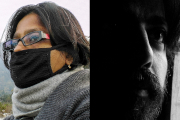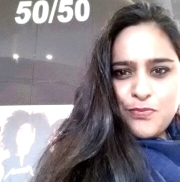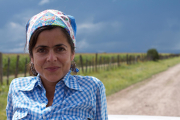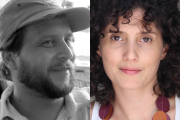THE WINNERS
2020 ALTER-CINÉ GRANT WINNERS
In 2020, the Alter-Ciné Foundation received 92 documentary submissions from 29 countries.

Sarmishtha Biswas and Debanjan Sengupta, recipients of a 10,000$ Alter-Ciné Foundation grant
|
|
| A first $10,000 award is granted to the Indian filmmakers Sarmishtha Biswas and Debanjan Sengupta for their project Without a Country. |
PROJECT DESCRIPTION
A 10 year-long journey into the depth of one of the world's last stateless lands, stuck in a geopolitical limbo for decades on the international border territory between India and Bangladesh – only to uncover the hitherto untold story of one ordinary family, who happened to be born there and condemned to live their life without any country, nationality or citizenship since the moment of their birth.
Yet, despite getting trapped in such a precarious situation of perennial statelessness, they long deep for a legitimate, dignified human existence, and desperately chase their long-cherished dream for citizenship against all possible odds.
The film intimately traces their bizarre struggle in search of an 'identity' – citizenship and a nation where they could belong. But finally, when they see their dream for Indian citizenship within reach, the recent political decisions threaten to destroy their dream forever and put their entire community in real danger.
In a time of widespread turmoil and unrest, will they ever achieve their cherished dream – a home they can call nation, a country where they will be a legitimate, rightful citizen?
|
|
|

Ajimesh Saha, recipient of a 10,000$ Alter-Ciné Foundation grant
|
|
| A second $10,000 award is granted to the Indian filmmaker Ajimesh Saha for his project An Insignia of a Forced Winter . |
PROJECT DESCRIPTION
Abdul, a Rohingya Muslim, escapes genocide and flees from his country Myanmar. Almost killed, he somehow manages to sneak into India in search of a new hope and life. But India doesn't want any Rohingya Muslim on its soil. The film captures Abdul at this juncture and follows his journey in India where he lives as an illegal immigrant under constant threat of deportation.
While he deals with his inner and outer conflicts of living a life of statelessness, in one night, all of a sudden, the entire Rohingya camp in New Delhi is burnt down to ashes allegedly by a youth wing party affiliated to the present regime of India. This devastates Abdul and he loses all his hope to live for.
As he struggles with life, he falls in love with Rujina, another victim of Rohingya genocide who lives in Bangladesh. Abdul and Rujina have never met with each other in person. With much difficulty, risking their lives they finally meet and get married. But the situation turns dangerous as they start living together with their new-born baby in the world’s largest refugee camp in Bangladesh. Will they be able to move out of the camp, the condition of which is deteriorating every day? Will they be able to find a home ever?
|
|
|
|

Ousmane Samassékou, recipient of a 5,000$ Alter-Ciné Foundation grant
|
|
A $5,000 grant is awarded to the Malian filmmaker Ousmane Samassékou for his project Les témoins de l’ombre .
|
PROJECT DESCRIPTION
On the border of the Mali-Algerian desert (Sahara), in the middle of the Sahel, a house stands as the only point of fall and reconstruction for many migrants on their way to Eldorado, or on their difficult return home with their families, painting an unhoped-for picture for many migrants who wander between life and death, hope and fatality.
The film's plot will be punctuated by an often more abstract, constructed and poetic account of wandering, embodied by the desert, which swallows and spits out its visitors, bringing hope but also drama.
|
|
|

Shazia Khan, recipient of a 5,000$ Alter-Ciné Foundation grant
|
|
Shazia Khan, an Indian filmmaker, receives a $5,000 award for her project I Never Left.
|
PROJECT DESCRIPTION
In search of a home, a filmmaker traces her way back home, to the beautiful valley of Kashmir In India, that she left by choice, when the Islamic armed rebellion started. Even though it peaked and waned in the 1990s, the conflict in the region is far from over.
People like the mother of three boys Tahira, open their hearts and share their pain, it has been 19 years since Tahira’s husband disappeared, the term for people like her in Srinagar town is half widow. Just like the land of Kashmir, she is stuck in a situation with no clear resolution in sight, a limbo, a waiting. In this time wrap the filmmaker searches for her own answers, why are there places that you will never leave, but neither can live in, is home a place or a mental condition?
|
|
|

Teresa Camou Guerrero, recipient of a 5,000$ Alter-Ciné Foundation grant
|
|
A $5,000 grant is awarded to the Mexican filmmaker Teresa Camou Guerrero for her project Cruz.
|
PROJECT DESCRIPTION
Cruz, a determined Rarámuri native from Mexico, and his family had their land taken from them by the drug cartel because they refused to grow opium poppies. They now live in exile under death threats while desperately seeking justice so they can safely return to their homeland.
|
|
|

Eryk Rocha and Gabriela Carneiro Da Cunha recipients of a 5,000$ Alter-Ciné Foundation grant
|
|
A $5,000 grant is awarded to the Brazilian filmmakers Eryk Rocha and Gabriela Carneiro Da Cunha for their project The Falling Sky.
|
PROJECT DESCRIPTION
The film accompanies the incessant struggle of a Yanomami shaman against illegal mining, deforestation of his forest land, and the xawara epidemics that have decimated his people over the centuries, now updated by the covid-19 pandemic. Transforming the literary and cosmopolitical manifesto by Davi Kopenawa Yanomami, one of the world's greatest indigenous leaders, and French anthropologist Bruce Albert, over the Yanomami-Indigenous prophecy about the end of the world and humankind, The Falling Sky brings to the screen the beauty of Yanomami cosmology and a fierce criticism about the predatory models that need to come to an end. Davi Kopenawa's word is therefore not a mere exotic prophecy. It is a diagnosis and a warning - that we all urgently must see and hear.
|
|
|

Alice Riff, recipient of a 5,000$ Alter-Ciné Foundation grant
|
|
Last but not least, a $5,000 grant is awarded to the Brazilian filmmaker Alice Riff for her project The Policeman and the Pastor .
|
PROJECT DESCRIPTION
The Policeman and the Pastor is a creative documentary feature film, which builds a deep and complex portrait of two characters, Alexandre, a civil police officer, and Valeria, an evangelical pastor. They are part of two movements: Anti-Fascism Policeman Movement and Evangelicals for Gender Equality, respectively. Public security and Christian values are at the center of contemporary social discussions in Brazil and worldwide.
The film build a portrait of the characters, exploring the internal conflict of those characters that consider they live in a "limbo": they are viewed with suspicion by progressive movements, and seen as traitors in the institutions in which they work. In a non-totalizing narrative, we will seek to walk around with the characters who deal with a very strong personal conflict, and find with them the power that can arise when we react to moments of crisis.
|
|
|
|
|